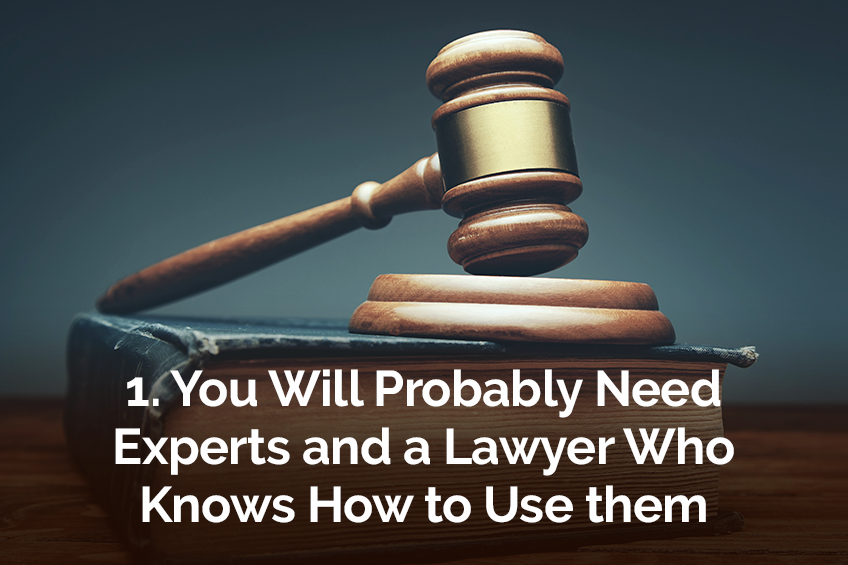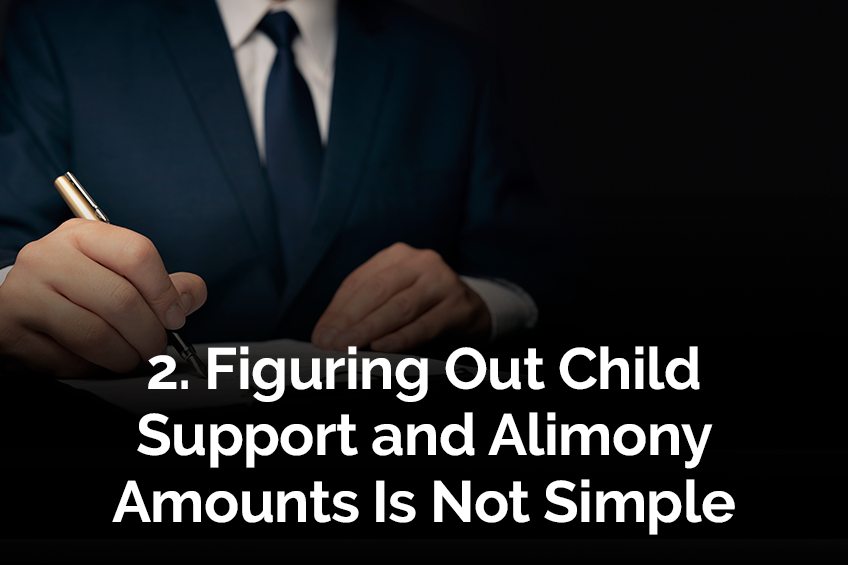
Common Mistakes People Make Going Through A High Net Worth Divorce
Divorce is rarely either simple or easy, but when the financial stakes are higher and the assets more complex, the whole ordeal can become even more fraught.
You’ll need to hire a Cherokee County based divorce lawyer who has solid experience dealing with high net worth divorce cases to help guide you through the process and fight for what you deserve.
Many people just want to get the whole thing over with as quickly as possible, and they may not even realize they’re in high net worth territory.
Or they may think their situation is simpler than most because they have a prenup or are parting on good terms.
So, let’s clear up a few things. First off:

What Is Considered a High Net Worth Divorce?
Definitions vary, but divorcing couples with assets worth more than $1 million are generally considered to be high net worth.
Some who wouldn’t even consider themselves particularly “well-off” fall into the high net worth category and fail to seek the right kind of representation during a divorce.
Small business owners, those with real estate holdings like rental properties or a vacation home and even families with a few investments that have appreciated over the years can easily wind up in this high net worth category.
Look carefully at your finances and make sure the lawyer you choose has experience with someone in your financial situation. Talking to a few candidates can help you determine how complex your situation may be, and they can advise you on what to expect in terms of length of proceedings, cost, etc.
How to Know If You Are Facing a High Asset Divorce
If your spouse brings in most of the money or handles the financial side of things, it may be difficult to know all the assets your family has and how much they’re worth. Even if you are fairly clued in, your finances may be quite complex or confusing. It is also not uncommon that one spouse will hide or misrepresent marital assets, especially if a divorce seems likely.
Here are some assets your family may have that will need to be examined and distributed fairly in a divorce:
- Real Estate. All residential and commercial real estate, including the family home, vacation homes, land, and rental or investment properties.
- Businesses. Stores, service providers, e-businesses, professional practices and more fall into this category.
- Retirement Accounts. Includes IRAs, 401Ks, mutual funds, pensions, and other retirement savings accounts.
- Bank Accounts. Checking and savings accounts, money market accounts and accounts held overseas or offshore.
- Securities. Stocks, stock options, bonds and other traded investments.
- Life Insurance Policies. These have monetary value and must be distributed equitably.
- Royalties. Revenues received for the use of intellectual property, including songs, original artwork, books and licensed material.
- Tangible Personal Property. Possessions, including everything from the furniture in your home to valuables like collectibles, jewelry, designer clothing, art, cars, boats and more.
If the total value of all of these tops a million dollars or more, you’re in high net worth divorce territory. Higher assets usually mean more complexity during a divorce and signal a need for a divorce lawyer with this specific type of legal expertise.
Why You Need a Lawyer with High Net Worth Divorce Expertise
Divorces involving lots of assets can become very complex very quickly, and when you add child custody issues, child support and alimony into the mix, experienced legal expertise becomes even more important.
Emotions can run high, power imbalances may be in play — especially when one spouse earns more — and you may not be able to count on your ex-partner’s honesty anymore.
Here are some reasons you need a Cherokee County lawyer who specializes in high asset divorce cases.
- You Will Probably Need Experts and a Lawyer Who Knows How to Use them
All of the assets we discussed above will need to be discovered and valued properly before they can be divided up fairly.
Even amicably divorcing couples may need help determining what assets they have and how much they’re worth. And unfortunately, trying to hide or undervalue assets is a very common problem.
Lawyers experienced in high net worth cases can recommend the right experts for your needs and help you avoid hiring ones you don’t. They will also know how to leverage these expert findings to your greatest advantage. Here are some expert services your lawyer may recommend:
Forensic Accounting
No one expects to need this, but finding hidden assets, including offshore accounts and “holding” companies where money may be hidden can help you get the right share of what’s yours. A forensic accountant does this and helps keep everyone honest.
Asset Tracing
Just because you acquired property during your marriage doesn’t necessarily mean it belongs equally to both of you. Tracing assets can be vital to showing what deserves to be split during a divorce and what doesn’t. An accountant or financial expert may need to analyze your financials for equitable property division.
Valuation Appraisers
Accurately estimating the value of your home, other real estate, the family business and tangible property like art, jewelry and collectibles will be crucial to getting your fair share. Figuring out the value of intangibles like IP, retirement accounts and offshore holdings can be even trickier. One or more valuation experts may need to be hired for this.
Tax Advisement
Knowing how much you’ll be taxed on certain assets like retirement or investment accounts, real estate, etc. in the long run can affect what you fight to win in court and play a big role in equitable distribution. A knowledgeable lawyer can let you know how much tax help you need for your situation and recommend a suitable expert.
Child Custody Evaluation
A child custody evaluator helps determine what’s in the best interest of the child if there’s a dispute about custody. In many divorces, this issue may be contested hotly, and a power/money imbalance can put one side at a considerable disadvantage. Having an expert opinion on your side can help level the field.
- Figuring Out Child Support and Alimony Amounts Is Not Simple
Determining child support and spousal support payments in any divorce involves some work, but in a high net worth situation it gets even more complicated.
Beyond the normal living expenses/conveniences calculations that apply in regular circumstances, additional expenses like private or boarding school tuition, competitive sports or arts training, and travel costs for children may come into play for wealthier families.
Trust funds and other inherited wealth vehicles further add to the complexity, and similar factors complicate alimony determinations, as well. Both sides will have lots of room to argue for greater or lesser awards, so having experience on your side is a must.
- You Need to Protect Your Interests
Even if your spouse doesn’t seem interested in taking you to the cleaners or leaving you high and dry, it’s still important for you to argue for your fair share.
If you’re the high-earner in the family, you could lose a significant portion of your wealth in an unequitable asset distribution or wind up paying more in alimony or child support if you’re outclassed in court. Those who earn less risk finding themselves in considerably reduced circumstances, which can feel even worse if you’re bringing your children with you.
Hiring the best lawyer for your circumstance is the only right choice to make—don’t let emotion or a feeling of guilt keep you from fighting for what’s right.
- Every Little Bit Is a Lot in a High Net Worth Situation
Feeling like you have enough resources to live comfortably or like quibbling over money is unbecoming will only hurt you during a high net worth divorce. Or you may be thinking you’ll pay a lot more for a high net worth lawyer, and it isn’t worth it because things are pretty amicable.
Know that high net worth lawyers aren’t always more expensive, and that even friendly divorces can turn acrimonious once the process begins.
Hidden assets or income, community property improperly identified as personal property and creative legal maneuvering on your spouse’s side can cost you a lot more than good legal representation.
Hiring a knowledgeable attorney with high net worth expertise is especially important when the stakes are high, as even a 1% increase in your award (or theirs) can mean upward of tens or hundreds of thousands of dollars.
You might not even much think about the difference — until you notice later how well your spouse is living compared to you.
FAQs About High Net Worth Divorce
- We Have a Pre-Nuptial or Post-Marital Agreement. Do I Still Need a Lawyer With High-Worth Expertise?
A pre- or post-marital agreement can help simplify a divorce and make the distribution of assets easier, but you should probably still choose a lawyer with high-asset expertise.
Why? Well, there may still be many high-value assets that need to undergo discovery and valuation, and issues like child support and alimony can also be points of contention.
Also, these agreements are not ironclad and can be challenged in court. Even if you think you have an airtight prenuptial or post-marital agreement, you may still need an experienced legal pro to fight for your interests.
- We Don’t Want a Difficult Battle in Court. What Are Our Options?
Communicating openly, agreeing on how to split up assets fairly and coming to a consensus on custody, child support and alimony will go a long way toward speeding up any type of divorce proceedings and avoiding a drawn-out fight.
Mediation can help you hash out the issues without lawyers before you go to court—a mediator guides you through the steps—or you can explore a collaborative divorce, which is a similar process that includes lawyers from each side working together toward an agreement.
- I’m the Lower-Earning Spouse. How Can I Afford a Lawyer As Good As My Spouse’s?
In situations where there is a large income disparity and your spouse earns more, you may be entitled to have your spouse pay your attorney fees. You can also petition the court to take your lawyer fees from the eventual settlement you’ll get once the assets are divided.
You may even qualify for post-separation support or temporary alimony for your living expenses.
If those aren’t an option, here are some other ways to fund your legal representation:
- Withdrawals from jointly-owned accounts
- Personal savings or retirement fund
- Loans against assets or retirement account
- Payment plan through the law firm
Talk to a lawyer about your legal rights to counsel fees, temporary alimony/child support and the rules governing your right to withdraw or borrow against money in jointly owned accounts. Many offer free or low-cost consultations, and they can help you figure out ways to pay your legal fees and fight for them in court, if necessary.
- I Earned/Contributed Less Than My Spouse, Will I Get Less of a Share of Our Assets?
Not necessarily. The process of dividing assets can be complicated and varies by state, but factors like the earning potential of each spouse, who’s caring for the children, and even bad behavior by one spouse can considerably influence the end result.
Inequitable distribution states like Georgia, property earned by one spouse such as retirement accounts are still subject to being divided in a divorce, regardless of whose name it is in. But the court will consider many factors when deciding how to fairly (equitably) distribute property after a divorce.
- Will Everything Just Be Divided 50/50, More or Less?
No. Georgia, for instance, is an equitable distribution state.. That means there’s not an automatic 50/50 split for property/assets acquired during the marriage. All property will be divided equitably, or fairly, but not necessarily equally.
Equitable division of property only applies to assets gained during the marriage (marital property), not those already held by a spouse before the marriage (separate property). Inheritances and gifts to one spouse, even those acquired during the marriage, also count as separate property.
- How Are Alimony and Child Support Amounts Decided?
Child support is usually determined by a set formula that varies by state, and in Georgia, the incomes of both parents are considered when calculating how much each parent must pay toward supporting a child
In high-income cases (defined as above $30,000/month in Georgia), however, the upper limit amounts defined by the formula may be exceeded if it’s considered to be in the best interest of the child. This is known as the high income deviation.
Other “deviation” factors that can be considered when calculating child support include:
- Insurance
- Travel
- Housing
- Medical
- Educational and athletic/training expenses
If any of these exceed the norm, child support may be awarded in higher amounts. These deviations are especially common in wealthier families.
There’s no set formula for calculating alimony, but the court will consider several factors when trying to determine amounts.
Factors like the length of the marriage, the ability of one spouse to pay alimony and the need of the other spouse for alimony and other relevant metrics will be considered when deciding an award amount.
What all this means is that there’s a lot of latitude to argue for greater or lesser amounts of child support, alimony and asset distribution in high net worth situations, so make sure your interests are being well defended by an attorney with the right experience.
Still Have Questions? Talk to a Georgia Attorney With Experience in Cherokee County High Asset Divorces Right Now.
Call Speights Law in Canton at (770) 575-8646 now to schedule a confidential consultation, with evening and weekend appointments available. We can assess your case, answer your questions, and talk about the next steps.










